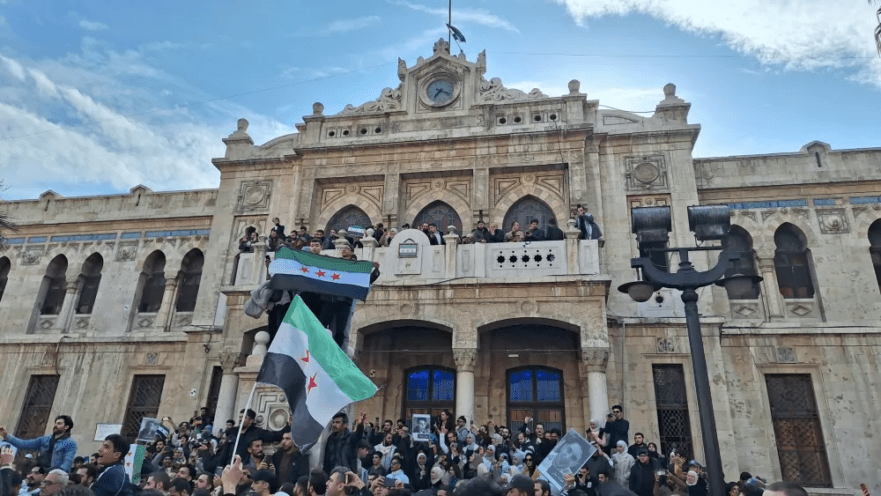21Wilberforce President, Wissam al-Saliby was quoted in this article written by Ken Camp for Baptiststandard.com about the future of Christians in Syria.
December 18, 2024
Many human rights advocates greeted the fall of Syrian President Bashar al-Assad with relief and optimism, but some groups focused on international religious freedom view Syria’s future with more questions than answers.
The overthrow of the Assad government signaled the end to more than 50 years of Baath Party rule in Syria. During Assad’s two dozen years as president, the government had a well-documented history of arbitrary arrests, torture, enforced disappearance and the use of chemical weapons against his own people.
“After over five decades of brutality and repression, the people of Syria may finally have an opportunity to live free of fear with their rights respected,” said Agnes Callamard, secretary general of Amnesty International.
“This historic opportunity must be now seized and decades of grave human rights violations redressed.”
Similarly, Lama Fakih, Middle East director at Human Rights Watch, called the regime change in Syria “an unprecedented opportunity to chart a new future built on justice, accountability and respect for human rights.”
Questions about fate of religious minorities
An analysis by International Christian Concern likewise noted Assad and his administration treated the people of Syria brutally and systematically stripped them of basic rights and freedoms.
However, ICC raised questions about how religious minorities will be treated in a government heavily influenced by Abu Mohammad al-Jolani, leader of Hay’at Tahrir al-Sham, an Islamist nationalist group.
The United States has recognized Hay’at Tahrir al-Sham and its predecessor organization, Jabhat al-Nusra as foreign terrorist organizations, and it offered a $10 million bounty for al-Jolani.
Hay’at Tahrir al-Sham originally was an affiliate of al-Qaida but later severed ties with the group. Al-Jolani spent eight years as an ISIS fighter in Iraq.
Encouraging signs in recent days include orders to protect religious minorities and the willingness of rebel fighters to allow continued Christmas observances.
“The initially positive signs in Aleppo do not, however, suggest that Syria is entering a new period of interfaith tolerance or widespread religious freedom,” the ICC analysis states. “Reports from the capture of Damascus include incidents of rebels inquiring into the religious identity of residents, suggesting that religion may continue to act as a point of tension.”
Al-Jolani has “much deeper roots as a persecutor of religion than a promoter of its free practice,” the ICC report states.
“Should al-Jolani continue to signal support for the rights of Christians and others, that would be a fundamental shift for the better. But that outcome is far from guaranteed, and a reversion to his old ways under ISIS and al-Qaida would be disastrous for these already vulnerable communities that suffered so much under Assad,” the report concludes.
Prayers for ‘stability and security of all Syrians’
Wissam al-Saliby, president of 21Wilberforce, offered prayer “for the stability and security of all Syrians, and for a transition to the rule of law where all citizens are treated equally before the law.”

“We’ve seen in other contexts in the Middle East that political transitions are risky and can lead to violence,” he wrote in an email to the Baptist Standard.
Up to this point, “traditional Christian communities in Syria” have enjoyed the freedom to worship, al-Saliby observed.
“The secular government treated them on equal footing with Muslims. Will this continue under the new rulers of Damascus?” he asked.
“Indicators to watch for include the safety and protection of Christians, the freedom for Christians to practice their rites, the right to a personal status law, and the right to manage their endowments, educational, medical and social institutions.”
During the period of political transition, as the new government takes shape, it also is important to see the degree to which Christians and other religious minorities are included, he added.
Muslim converts to Christianity present “a much more delicate” issue, al-Saliby wrote.
“Many Middle Eastern countries recognize the historic Christian communities but deny non-Christian citizens the right to espouse the Christian faith,” he stated.
“Since the start of the Syrian civil war, tens of thousands of Syrians, in Lebanon, Jordan, Turkey and Syria, have accepted Jesus as Lord and Savior in an unpreceded movement of the Spirit. Some church planting in Syria is now led by these Christians. How will the new rulers of Damascus accommodate for this group? Will they have to go underground?”
How will other nations respond?
Another unanswered question is how other nations will respond to the political changes in Syria. To date, Christians in Syria have been outspoken in criticizing American and European sanctions, al-Saliby noted.
“The impact of sanctions contributed to many Christians leaving the country in search of better economic conditions. Now that the regime has changed, will Western governments remove sanctions that have hindered the economy and reconstruction of Syria?” he asked.
Refugees International reports more than 6 million Syrians are refugees and at least 7 million are internally displaced.
“Mass refugee repatriation will be a slow and delicate process, contingent on factors including restoration of legitimate and effective governance, security conditions, an effective recovery and reconstruction effort, resolving complex housing and property rights disputes, and substantial humanitarian investments,” Etant Dupain, spokesperson for Refugees International, wrote in a Dec. 17 email.
“None of this will materialize quickly, and refugee-hosting governments should expect repatriation to proceed gradually as sustainable conditions for safe return begin to emerge within Syria. Moves by some European governments to halt asylum processing for Syrians are ill-advised and should be reversed until political and security conditions stabilize.”
Continuing humanitarian crisis
In the meantime, Dupain added, “Syria remains in the grips of a major humanitarian crisis.”
“All of the humanitarian needs that existed just three weeks ago are still present in post-Assad Syria. What has changed now is that humanitarians have the access to begin addressing these needs, albeit for an unknown window of time,” Dupain wrote.
“In that window, it is critical that the humanitarian response rapidly scales to surge in aid and capitalize on the current window of opportunity.”

Elijah Brown, general secretary of the Baptist World Alliance, noted his organization heard “from multiple sources a sense of cautious optimism that real and lasting positive change may be on hand” in Syria.
“There are initial indications that religious freedom for all people will be respected, even as we have also received requests to pray for protection, preservation and provision,” Brown said.
“The BWA joins in prayer for the reunification of families separated as refugees, for the strengthening of religious freedom for all people, and that in this Advent season, that the message the angels proclaimed at Jesus’ birth will once again resound, ‘and on earth peace.’”
Featured image caption: Activist Mazen al-Hamada’s 12 December funeral turned into a demonstration and celebration in Damascus’ al-Hijaz Square. Credit: Zeina Shahla/TNH

